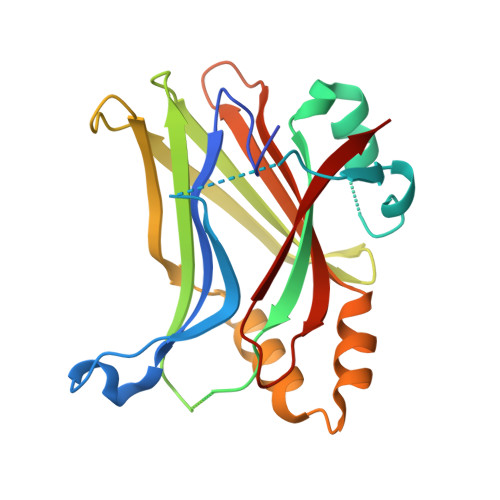Small-Molecule Covalent Stabilization and Inhibition of the TEAD·YAP1 Transcription Factor in Cancer Cells.
Yeh, I.J., Bum-Erdene, K., Ghozayel, M.K., Gonzalez-Gutierrez, G., Meroueh, S.O.(2025) ACS Chem Biol 20: 2142-2158
- PubMed: 40864874
- DOI: https://doi.org/10.1021/acschembio.5c00283
- Primary Citation of Related Structures:
9Q1M, 9Q1N, 9Q1O - PubMed Abstract:
Transcriptional enhanced associate domain transcription factors (TEAD1 to TEAD4) bind to transcriptional coactivator Yes-Associated Protein (YAP1) or its paralog transcriptional coactivator with PDZ-binding motif (TAZ) to regulate Hippo pathway target genes. The Hippo pathway is a conserved signaling pathway that regulates organ size and cell fate by controlling cell proliferation and apoptosis. Here we report small acrylamide molecules that form a covalent bond with a conserved cysteine at the TEAD palmitate pocket. Binding studies showed profound stabilization of TEADs by the small molecules, and cocrystal structures reveal that the compounds mimic the binding mode of palmitate. The small molecules achieved submicromolar binding constants and subhour reaction half-lives for all four TEADs. In mammalian cells, the compounds stabilize the TEAD•YAP1 interaction yet inhibit the TEAD transcription factor activity. Unexpectedly, several compounds degraded TEAD and YAP1 proteins and inhibited cancer cell viability. This work suggests that degradation of TEAD and YAP1 may amplify the antitumor effects of small molecules targeting the TEAD palmitate pocket, with implications for other cancer targets featuring allosteric lipid-binding sites.
- Department of Veterans Affairs, Richard L. Roudebush VA Medical Center, Indianapolis, Indiana 46202, United States.
Organizational Affiliation:

















